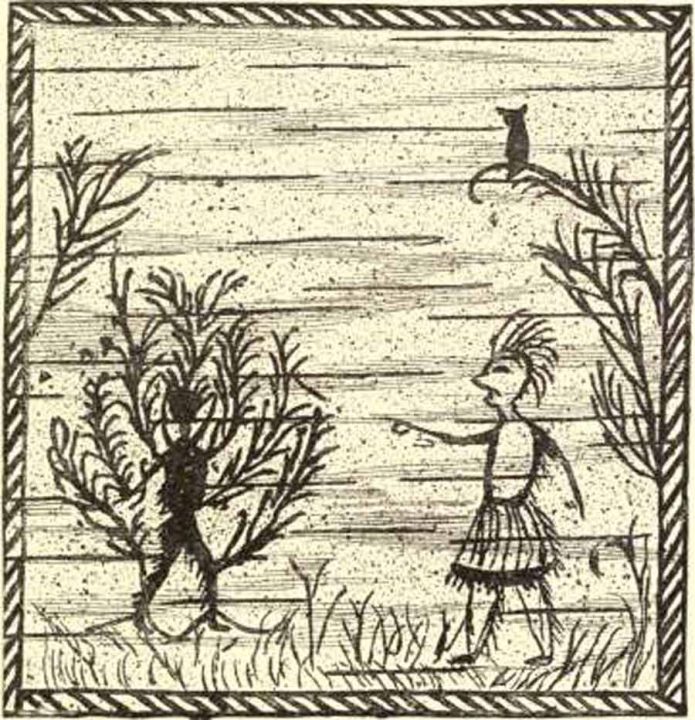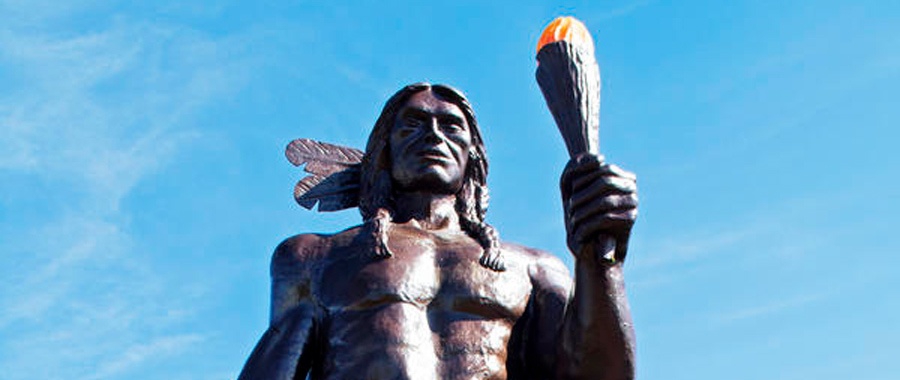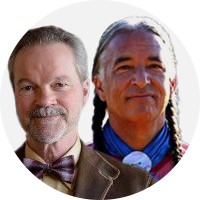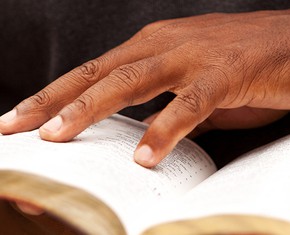The views expressed in our content reflect individual perspectives and do not represent the authoritative views of the Baha'i Faith.
Preserving indigenous languages goes hand-in-hand with preserving indigenous cultures and sacred traditions. If that doesn’t happen, humanity will lose much of its rich spiritual heritage forever.
To examine those preservation efforts, and to delve into the less-widely-known Indigenous spiritual traditions, this series of conversations between Chris Buck and Kevin Locke focuses on various Indigenous messengers of God – the founders, prophets and culture heroes of tribal peoples in the Americas.
Q: Kevin, one way of promoting and ensuring preservation of cultural identity is by raising public awareness and appreciation of Indigenous knowledge about their own spiritual traditions. This kind of information deeply interests Baha’is, who prize the primary Baha’i principle of the independent investigation of the truth:
God has created in man the power of reason, whereby man is enabled to investigate reality. God has not intended man to imitate blindly his fathers and ancestors. He has endowed him with mind, or the faculty of reasoning, by the exercise of which he is to investigate and discover the truth, and that which he finds real and true he must accept. He must not be an imitator or blind follower of any soul. He must not rely implicitly upon the opinion of any man without investigation; nay, each soul must seek intelligently and independently, arriving at a real conclusion and bound only by that reality. – Abdu’l-Baha, The Promulgation of Universal Peace, p. 291.
The St. George’s Indian Band (Mi’kmaq), for instance, has one of the most attractive and informative websites that I’ve recently seen. So naturally, as a Baha’i highly committed to the independent investigation of the truth, I became interested in seeing if that site included anything about the teachings of Gluskap (or Glooscap or Kluskap, with a wide array of alternate spellings), the storied “holy man” of the Mi’kmaq tradition. To my surprise and delight, I found this statement:
Legend of Glooscap
The following is taken from the book “Glooscap Legends“ by Stanley T. Spicer
The land of the Wabanaki, the land nearest to the sunrise, comprises the area along the Atlantic seaboard inhabited by numerous Indian tribes including the Micmacs, Malecites, Penobscots and Passamaquoddies. Through the years one of the great legendary figures among these peoples has been the god-man Glooscap.
Glooscap was endowed with supreme powers. … Always he was portrayed as kind, benevolent, a warrior against evil and the possessor of magical powers. – St. George’s Indian Band, Legend of Glooscap.
Note that the tribe uses the word, “legend” here, instead of the more frequently-encountered and sometimes pejorative term “myth.” The Oxford English Dictionary defines “legend” this way:
A traditional story sometimes popularly regarded as historical but not authenticated; a fable, a myth. In scholarly use legend is distinguished from myth as typically involving (potentially) historical figures acting within an earthly environment, though supernatural elements are frequently present.
So, based on this definition, a legend may have a real historical origin, or core of facts, later embellished by stories, some of which may strike readers as fanciful in nature. Would you like to comment, Kevin, on how this choice of the word “legend” might serve as the best term – located somewhere between history, with its hard, verifiable facts; and myth, those unverifiable and often impossible narratives which often operate as stories that convey sacred, moral, and social truths?

A: Each of the English words: “legend,” “myth,” “fable” have seriously loaded and freighted connotations. They all suggest, in one way or another, that these oral histories of holy people, the Indigenous messengers of God, are somehow specious, made up or not really true. This minimizes our traditions and makes them seem somehow inferior to other spiritual teachings.
In Lakota, we use the term “wóyakapi” or narrative as a general descriptor of these accounts. Other qualifiers can be added to achieve equivalent English meanings, such as sacred narrative, fanciful narrative, etc. As we begin the process of “decolonizing” our consciousness, it’s good to find the terms that elicit the least alarm – and to use them in the most straightforward and honest way:
The first remedy of all is to guide the people aright, so that they will turn themselves unto God, and listen to His counsellings, and go forth with hearing ears and seeing eyes. … They must cleanse their hearts from even the slightest trace of hatred and spite, and they must set about being truthful and honest, conciliatory and loving to all humankind – so that East and West will, even as two lovers, hold each other close; that hatred and hostility will perish from the earth, and universal peace be firmly rooted in their place. – Abdu’l-Baha, Selections from the Writings of Abdu’l-Baha, p. 244.
Q: Kevin, you recently traveled to the Passamaquoddy Tribe of Indian Township – the largest Indian reservation in the Northeast state of Maine, close to Canada – where you were invited to perform. When we spoke shortly afterwards, you told me that you had a very pleasant talk with a Passamaquoddy Baha’i, and that, in the course of your conversation, she mentioned the important indigenous figure of “Gluskap” (which actually means the “Liar”). You told her that you had heard of Gluskap before, and that you understood that Gluskap was a “trickster” figure. The Baha’i was taken somewhat aback by your comment, and hastened to correct you. The Baha’i said that, in her view, Gluskap was an Indigenous messenger of God. Is that true? If so, would you please tell us more about your experience at Passamaquoddy?
A: I have never been able to figure out how to go deeper into a conversation about Gluskap, but I do know exactly the people to approach. One Baha’i in particular is an impeccable Mi’kmaq linguist, who I’m sure could solve this riddle for us.
Q: Several times before, you have recommended that we talk and write about Gluskap. This has been a challenging task for me, because there’s some controversy, among scholars, regarding the authenticity of some of the traditions, owing to bad early scholarship on the part of one major anthropologist in the past.
Another reason why Gluskap has been a daunting topic for me is that the stories are so varied and, in many cases, disconcerting to a non-indigenous person, like myself. Here’s why: Gluskap has been variously described as a Creator, trickster, transformer, culture hero, the “Good Twin,” “the Liar” (for promising to return and failing to do so, and for other reasons as well), “Cheat,” “Deceiver,” etc. As you would expect, the less-than-worthy stories about Gluskap, which depict him as not only mischievous but downright deceitful, are difficult for me to understand and appreciate, much less accept as part of the hypothetical core tradition regarding Gluskap’s role as an Indigenous messenger of God. What’s your take on this?
A: If the mistakes perpetuated about the Mi’kmaq holy messenger are anything comparable to what has happened with the Lakota, then it would be imperative to check with a competent speaker who also has a grasp of the traditional spiritual heritage.
Q: I agree, so I did a lot of searching and sifting, critically reading the sources I consulted. Let me disclose my method and choice of traditions: I have chosen to focus on Penobscot traditions regarding Gluskap, as documented by the highly respected anthropologist, Frank G. Speck. The Penobscot Nation, one of the tribal groups of the Eastern Algonquians, inhabits the Penobscot river valley of central Maine.
So, Kevin, before asking you to comment on some of the Gluskap narratives that I have selected, let me ask you this question: Is it okay for me to be a little bit skeptical about some of the sacred Indigenous conditions regarding Gluskap, for instance? The same question can be broadened to include other Indigenous traditions, of course – or any tradition, for that matter.
Another way of putting this question is this: Would you agree that not everything in Indigenous traditions is necessarily original and otherwise authentic, even if widely believed? I understand that this is a culturally sensitive question, and that’s why I’m asking your views on this, since you are an indigenous person. What are your thoughts?
A: Yes, I am very skeptical about everything. Anything one encounters can be very slanted in opposite extremes, depending on the lens of the viewer. Some information is pointedly mean-spirited, while other information can be overly romanticized. You are very correct to identify well-respected, credible scholars – and, I would add, to consult knowledgeable members and elders of the tribe, as well. As the Baha’i teachings say, we should investigate reality with our eyes wide open:
Discover for yourselves the reality of things, and strive to assimilate the methods by which noble-mindedness and glory are attained among the nations and people of the world.
No man should follow blindly his ancestors and forefathers. Nay, each must see with his own eyes, hear with his own ears and investigate independently in order that he may find the truth. The religion of forefathers and ancestors is based upon blind imitation. Man should investigate reality. – Abdu’l-Baha, Divine Philosophy, p. 24.
Q: Thanks for these insights, Kevin. In our next article, I’ll ask you about some very interesting Penobscot legends of Gluskap.
















Comments
Sign in or create an account
Continue with Googleor